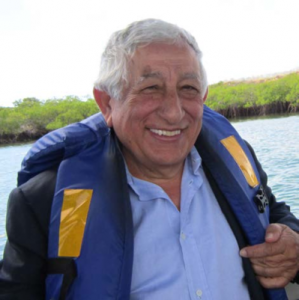Gasparini Paolo (1937 - 2016)
 Paolo Gasparini, professor emeritus of Solid Earth Physics at the University of Naples, Federico II, eminent scientist and volcanologist and prominent celebrity within the international scientific community, died last summer, July 28, 2016.
Paolo Gasparini, professor emeritus of Solid Earth Physics at the University of Naples, Federico II, eminent scientist and volcanologist and prominent celebrity within the international scientific community, died last summer, July 28, 2016.
Paolo Gasparini started his academic and research career at the institute of Earth Sciences of the University of Naples. In 1970 he became full professor of Solid Earth Physics, director of the institute of Earth Sciences, as well as the Head of the Mt. Vesuvius Observatory, role that was long maintained until 1983.
Thanks to his impulse, the group of Geophysics and Volcanology of the University was born and has become, in the following years, one of the leading groups for the quality of the research activities, within the Italian and international scientific community.
During his 40 years of academic career, he has covered numerous prestigious roles, being part of national and international committees. Among them, we remind the five years as President of the International Association of Volcanology and Chemistry of the Earth's Interior and the management of the National Group of Volcanology. As an academician, Paolo Gasparini has covered many institutional roles, always devoting to the University his knowledge of Earth Sciences and his competences on the evaluation of environmental risks, mostly related to earthquakes and volcanic eruptions.
For his entire research career, Paolo Gasparini has always aimed at ambitious scientific goals, by investigating frontier topics of Geophysics and Volcanology and reaching innovative and high-impact results for the scientific community. The launch of tomographic experiments on Mount Vesuvius and Campi Flegrei area and the supervision of these projects, which have led to the identification of the major magmatic reservoirs of Neapolitan volcanoes, are owed to his original ideas and to his capacity of conceiving futuristic projects.
Paolo Gasparini loved to face scientific difficult challenges, impossible to a certain extent, because of his genuine sense of a traditional scientist; the sense of being at the frontier of the research, where the most arduous scientific issues, the "big challenges", are solved.
Very recent is the successful experimentation on the Earthquake Early Warning Systems, for the real-time mitigation of the damage produced by a seismic event. Earthquake Early Warning is a frontier topic in Seismology and Engineering Seismology research and its main goal is to develop methodologies and tools for the real-time the seismic risk mitigation.
The analysis and mitigation of the natural risks has been the major scientific goal of AMRA technological consortium (involving Federico II, INGV, CNR and other universities of Campania), that Paolo has created and guided with passion over the last ten years.
AMRA involves the most advanced competences in the field and has a leading national and international role in applied research and in the management of environmental risks and emergencies.
Finally, we all remember Paolo's dedication to the teaching activity, followed with passion and enchant from most of his students. Coordinator of the PhD. Programme in Geophysics and Volcanology, in 2000 he founded the PhD. Programme in Seismic Risk, with the main purpose of creating expert researchers, with broad competences on all the aspects related to the seismic risk, from the mechanical generation of seismic fractures, to the propagation of seismic waves and to the seismic engineering.
Paolo has always had an active role in the research activity and has been leader and coordinator of numerous international projects. Through these projects, young and brilliant scientists from worldwide countries have developed their own talent and have achieved their ambitious and innovative scientific goals. This young scientific community, orphaned of enthusiasm and mentoring, has now the heritage of his knowledge and the challenging task to pursue his way; with perseverance, optimism and endless scientific curiosity.
Aldo Zollo, Professor of Seismology, University of Naples Federico II
